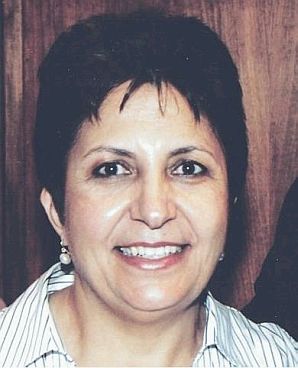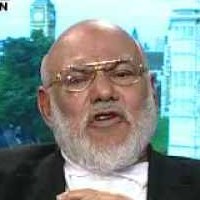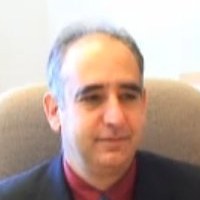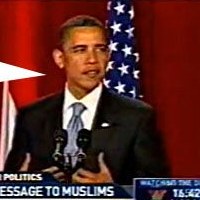“The truth will set you free, unless you are afraid of it”
If you own a computer and hadn’t heard the name “Wafa Sultan” prior to last February, you were bound to have become familiar with it since then. A record eight million hits and counting have been charted on a six-minute video clip – originally subtitled and circulated on the Web by the Middle East Media Research Institute – in which Sultan, a Syrian-born, Los Angeles-based pundit (trained as a psychiatrist) slams Al Jazeera host Faisal al-Qasim and guest Ibrahim Al-Khouli about the ills of Islam.
That Sultan is an Arab woman telling off her male challengers on this particular network is only part of the reason her appearance is so startling. More sensational is the fact that the outspoken 49-year-old is herself a Sunni Muslim. Well, she was born and raised as one, at any rate. And, unlike many of her sympathizers, she does not hold with the opinion that Islam was “hijacked” by extremists. On the contrary, she says, serious research into the holy texts led to her own personal rejection of the religion. The faith, she says, cannot be reformed, but rather has to be “transformed.”
Anyone hearing the keynote address she gave earlier this month at the conference “Women in the Middle East – the Beacon of Change” (held in Washington by the American Enterprise Institute) would have been hard pressed to disagree with her assessment. Not that the other panelists – myself excepted – had anything rosy to report on the treatment of their countries’ female population.
In fact, the only “disagreement” among the participants, who hailed from Egypt, Tunis, Libya, Lebanon, Iraq, Saudi Arabia and Sultan, from Syria, was the extent to which women could and would ever be able to enjoy freedom under Islamic regimes. Otherwise, consensus had it that women’s and human rights violations throughout the Arab world are so egregious that if change doesn’t come from within – and pressure isn’t applied from without – then the world is in for a lot worse than 9/11.
If the blood-chilling tales Sultan and others recounted of abuse against girls and women in the name of Muhammed and Allah are true, there is indeed much cause for alarm.
Sultan began her speech with the description of an honor killing that took place in the Palestinian Authority in 2003:
“‘Tonight you die,’ Suad told her daughter, before wrapping a bag tightly around her head. Next she sliced her daughter’s wrist… ignoring her daughter’s muffled pleas, ‘No, Mother, No.’ After her daughter went limp, Suad struck her in the head with a stick. The killing of her child took 20 minutes. Suad told a visitor through a stream of tears, ‘She killed me before I killed her. This was the only way to protect my family’s honor.’ …This poor teenager’s sin was being raped by her two older brothers.”
Sultan continued with another story, this one from Saudi Arabia in 2002:
“The religious police stopped school girls from leaving a blazing building because they weren’t wearing correct Islamic dress… Young lives were forced to perish barbarically…”
“Once we realize the cruelty of an ideology that can harden the heart of a mother, or can consider young lives as expendable, we will be able to find remedies for liberating the women of the Middle East, where countries in different degrees are ruled by the Islamic Sharia.”
The passion Sultan displayed during her diatribe was peculiarly uplifting, in spite of its horrifying content. Speaking privately with the married mother of three – whose English is fluent but heavily accented – one could see how such an apparent contradiction-in-terms was possible.
In an hour-long interview the day after the conference, Sultan was as cheerful and optimistic in person as she seemed like an angry dynamo from the podium. The contrast in her personas was striking – a metaphor, perhaps, of the two vastly different lives she has led. She grew up as a religious girl in Banyias (“a small town on the Mediterranean”), attended medical school in Aleppo, and now lives as a secular American in California, where she settled in 1989, eight months after her husband, and two years before her two elder children (her youngest was born in the US).
JP: Was it dangerous for your children to remain behind, given who you are?
WS: Not at all. At that time nobody knew who I was. I wasn’t Wafa Sultan, the one you’re interviewing today. I was a totally different kind of person.
JP: If you were “a totally different kind of person,” what made you want to move to the United States?
WS: I was looking for a better life – freedom to express myself – because I was born a writer. All my teachers said so. But anyway, I secretly underwent a change before coming to America.
JP: Did you and your husband undergo this change together?
WS: Yes. We met in 1975, at university in Aleppo, when I was in medical school and he was studying agriculture. It was against our culture for a man and a woman to have an unchaperoned relationship, so we had to conduct our friendship in secret – which we did for four or five years prior to our marriage. Being away from my family made this relative freedom possible. But 1979 was the real turning point of our lives. It was the year I witnessed the murder of a professor of mine. While shooting him, the killers were screaming “Allahu Akbar [God is great]!” I was in a state of shock. The sound of the bullets became associated in my mind with Allah.
JP: Why was your professor targeted?
WS: For no reason other than belonging to the Allawi sect of Islam – that of the president – while the majority in Syria were Sunnis. And at that time, there was a bloody conflict between the government and the Muslim Brotherhood. But I knew for a fact that he was not involved in politics. I was devastated, and began to question what kind of Allah this is.
JP: Until then, were you and your family devout Muslims?
WS: Oh yes. I had to fast, I had to preach about Islam…
JP: What altered that?
WS: After the trauma of the murder in the name of Allah, I delved into all the Islamic texts – the Koran and the Hadith – carefully studying each, one by one.
JP: What made you question Islam rather than the specific perpetrators of the murder? You could have reached the conclusion that Islam was being abused by certain people, after all.
WS: That’s exactly what I was trying to find out through my research – whether Islam is inherently violent, or whether its adherents misunderstand its teachings. The more I researched, the more convinced I became that the root was in Islam itself. I believe that beliefs drive behaviors.
JP: Is belief-driven behavior something you come across in your work as a psychiatrist?
WS: Of course. In order to change any situation, you have to change people’s behavior. And in order to change their behavior, you first have to change their belief system.
Look, the Iraqi woman on the panel [Pascale Warda] told me about a case of a man killed in Iraq for selling ice, since Muhammed didn’t use ice. Can you imagine? According to Sharia, selling ice is a crime! She also told me that Iraqis believe that you must not put cucumbers and tomatoes in the same bag, because cucumbers are male and tomatoes are female. This is an example of a dangerous belief system driving bad behavior.
JP: Can you give an example of a non-religious belief system driving bad behavior?
WS: This woman in Texas who drowned her five children in the bathtub. She believed she heard a voice ordering her to kill them. To some extent, I can understand her act, because she couldn’t resist the commands in her head: “Kill them! Kill them!”
JP: In your lecture, you described a Palestinian mother strangling her teenage daughter for having committed the “crime” of being raped by her two brothers. Whereas the mother in Texas was deemed psychotic and sentenced to an institution, the Palestinian mother’s act was sanctioned by her society as a necessary honor killing. What in the Islamic world would be considered psychotic behavior?
WS: What I am doing would be considered crazy behavior. I abandoned my belief in Islam – so I must be crazy. In fact, I can show you hundreds of e-mails telling me that I’m a sick-minded woman.
JP: Your view of Islam is dim, and your rejection of it indicates pessimism about its ability to reform. If so, what is the solution to its spreading radicalization?
WS:I personally don’t believe Islam can be reformed. But my view is very much needed among those who wish to reform it. There are two choices: rejection or reform. My voice forces the reformists to work even harder. The first step is for the West to put pressure on Islamists to respect my right to reject Islam as much as I respect their right to believe in it. Once Muslims are free to choose, the rest will take care of itself. The real solution, in other words, is transformation, not reformation.
JP: Christianity underwent a reformation. Why not Islam?
WS: They are not comparable. According to Islam, anyone who questions a single word of the books or teachings should be killed.
JP: Do you think a “transformation” will be best achieved through the men or the women?
WS:Through the women. Muslim women have everything to gain by a transformed Islam and nothing to lose. They’ve already lost everything. Muslim men, on the other hand, won’t relinquish their powers so easily.
JP: Judging by the speeches of the women at the conference, one has to be extremely strong and courageous to be willing to fight for freedom in Islamic countries. Surely, doing so takes a special kind of person. How many such special people are there?
WS: You would be surprised to discover how many women out there are waiting to be given the opportunities I have. They’re ready. They just need to be encouraged.
JP: Maybe that’s easy to say when you live in California, as you do now. If you were still living in Syria…
WS: It would be impossible for me to be who I am. On the other hand, when I lived in Syria, I didn’t have a voice like mine to guide me. Nor did I have the Internet. Today, the conditions are different. Women in Islamic countries now have more opportunities than before. And they have me. In fact, there’s a group in Syria right now getting together to establish an organization called the Friends of Wafa Sultan.
JP: Is it a group of women?
WS: Both men and women. The leader is a male teacher, who is secretly enlisting students. I received many e-mails from these people. And I told them I would support them, even financially, to help me spread my message.
JP: How would a woman who is being controlled and terrorized by her father or her husband have access to a computer or be able to attach herself to such an organization?
WS: It’s not easy, but it’s possible. The men cannot watch them 24/7. It is crucial for these women to stop being victims. There’s always a way to instigate change, even if it’s very small and gradual. I try to inspire and encourage women to find a way to do this.
JP: How did your own parents respond to your shift?
WS: My father died when I was 10. My mother hasn’t spoken to me for two years. I understand her situation. It’s tough on her. She’s ashamed of me. If my family lived here in America, they might be able to understand me. But, from where they’re sitting, it’s a tough task.
JP: Yet your mother is also a woman who suffered – and continues to suffer – from restrictions. Why doesn’t she believe in the message that you are conveying?
WS: She, like too many women in the Islamic world, grew up with the belief that they have to have a man to protect them. My mother came to visit me in the US four times since 1989. And she got very angry whenever I asked my husband to bring me a cup of water. She reprimanded me by saying, “You’re a woman; you have to serve your husband.”
This mentality has been shaped for 1,400 years.
JP: How was it all right for her to leave Syria to visit you?
WS: One is welcome to leave Syria at any time. But now, I believe it’s much harder for any member of my family to leave. Nobody has tried in the last couple of years, but I think that if they did, the authorities would want to punish them for my actions.
JP: When I asked you whether change would be effected through the men or the women, you said that it would be through the women. Yet, the underground network you mention is being led by a man. Isn’t this a losing battle without the cooperation of men?
WS: The men are definitely needed. What I meant was that not every woman needs a man to inspire her to rise up. Or to open the door for her. It’s important to instill in their minds that they can do it themselves.
JP: Are Western feminists on your side? I have encountered Americans and Israelis who – when it comes to the rights of women in Arab countries – side with multiculturalism. Has this been your experience as well?
WS: Yes it has. I haven’t received the kind of support I expected from women in the US. Recently, I gave a speech at the University of California, and during the question period, an American woman told me she didn’t believe the things I was saying about Muslim men’s treatment of women. She said: “Muhammed was the first man on earth to give women rights.”
I responded, “Would you please tell me what some of those rights are, so I can tell Muslim women to be aware of them?”
She said, “I don’t know, but I was invited to a mosque in LA, and that’s what the mullah told us.”
Can you believe how naive these women are?
JP: From whom have you received the greatest support?
WS: From the Jewish community, of course, which is very aware of what’s going on. But also from the atheist community.
JP: How do you feel about Saudi Arabia – in which women are not even allowed to drive cars – sitting on the human rights commission at the UN?
WS: I blame the free world for this travesty. Shame on America! Shame on any country that calls itself civilized and has relations with Saudi Arabia.
There is a saying in Arabic: When Pharaoh was asked, “Who made you Pharaoh?” he replied, “Nobody stopped me from becoming Pharaoh.”If there is no one to stop evil, don’t blame the evil. Saudi Arabia hasn’t been stopped from doing what it’s doing to half of its population.
JP: Are the Saudis the worst among the Islamists in this respect?
WS: Yes, and I believe they Islamicized the Syrians. They are behind the trouble everywhere. In 1991, when I was relatively new to this country and struggling financially, I was offered $1,500 per month by the Saudis to cover my head and attend a mosque. In California, when you tell any American about this, he says, “Who cares?”
You have to care and you have to pay attention! Not caring and not paying attention is why we ended up with the events of September 11 – events the likes of which I expected and predicted well before.
JP: Why did you expect such a massive terrorist attack?
WS: Two or three years prior to 9/11, a Jordanian Islamist came to LA to attend an event held by the Muslim community there. I wasn’t there, but I read in the newspaper that he gave a speech in which he said, “Now we are ready to rule the world.”
Nobody paid attention to that but me. I wondered why nobody asked him, “What kind of political, economic, moral or psychological readiness do you have to rule the world?”
And I thought, “How stupid these Americans are. It’s happening right inside their country.”
I wanted to tell them, “Fight terrorism here before you fight it there. Protect yourself here before you go there for that purpose.”
That guy knew what he was talking about when he said the Muslims were ready to rule the world.
JP: Is Islam the problem? Or are Arabs the problem? After all, secular Arab leaders have been just as bad as religious ones when it comes to human and women’s rights.
WS: I don’t believe it. You cannot be secular and a dictator at the same time. [Secular Arab leaders] repress the problem [of radical Islam]. They sweep the dirt under the carpet, rather than clean it up. They have never come out and said that we have problems in our teachings. Indeed, they oppress anyone who expresses this sentiment.
JP: Are you saying that Islam is a tool for such leaders to keep their people down?
WS: Exactly. When I was in Syria, I never heard of a religious school teaching the Koran to five-year-olds. Now I was told there are 5,000 religious schools in Syria, teaching 5-10-year-olds only about the Koran. No math; no science; nothing else but religion. I don’t believe you can call leaders of such a country secular.
JP: What about suicide bombing? Is that also a tool used by leaders of Arab countries?
WS: Martyrdom is deeply rooted in our teachings. The Koran clearly states that God buys your life from you – “To kill or to be killed.” But with the help of Saudi money and Wahabbism, what was written in our holy book came to life.
JP: Are the Saudis also involved in Palestinian terrorism?
WS: No question about it. They are everywhere. People [all over] are starving for a piece of bread, while millions upon millions of dollars are being spent on building mosques. And how many Americans – if offered $1,500 a month to cover their heads or become Muslims – would turn that down? I heard the Saudis are willing to pay $1,000 to any man who changes his name to Muhammed. How many poor or homeless people would refuse that offer?
JP: Should President Bush have shut down all American mosques in the aftermath of 9/11?
WS: He didn’t necessarily have to shut down all mosques. But at least he could have begun paying close attention to what’s going on inside them; at least open their books before children read them; at least question the content of those books, and demand an answer; at least watch what they are up to.
JP: If the mosques in the US were watched, and their books examined, how would that help other countries?
WS: It would at least be a first step.
JP: How do you view Bush’s relations with the Saudis?
WS: As a double standard. And that’s how people in the Middle East see it as well. He’s riding on two horses – trying to democratize Iraq on the one hand, and having relations with Saudi Arabia on the other. That’s what worries me. I don’t know if the administration is serious enough to make a change. I really doubt it.
JP: Would a better US policy have been to throw money around, like the Saudis do, to foment revolutions in Arab countries?
WS: Why not? Dissident groups need to feel supported. I’ve heard that only three percent of the Syrian population have access to the Internet, for example. Why not provide them with computers, radio and TV broadcasts… so they can be exposed to different cultures, and freely choose their own way of life? Islam has been the only source of knowledge or information in the Middle East.
A few days ago, I asked a Palestinian I met: “Let’s assume that all the Jews of Israel were to convert to Islam, would you still fight them?”
He said, “No.”In that case, the land is not the problem.
A month ago, I read on a Saudi Web site that Muhammed was walking with a group of his followers, and they heard a noise; so they asked him what it was. He said: “Oh, don’t worry about that, it’s only God torturing the Jews in their graves.”
But during the time of Muhammed, there was no Israel or America. So there you have it. Our biggest problem is religion. If we overcome that, we will be able to resolve the political problems.
Source: – The Jerusalem Post, published on 26 october 2006; by Ruthie Blum Leibowitz



 RSS
RSS











Latest Comments
Hello Mike, Thank you for your positive feedback to the article. I felt there wasn’t too much critical analysis of ...
Thanks for this considered and well constructed article. A follow up article on the manner in which the editorial contro...
THE CLUELESSNESS OF CLAIMING THAT OBAMA'S MIDDLE EAST POLICIES WERE A FAILURE CANNOT BE FURTHER FROM THE TRUTH, WHAT THE...
As long as Obama is the president of the usa do not trust the us government......
Thank you for an good read....